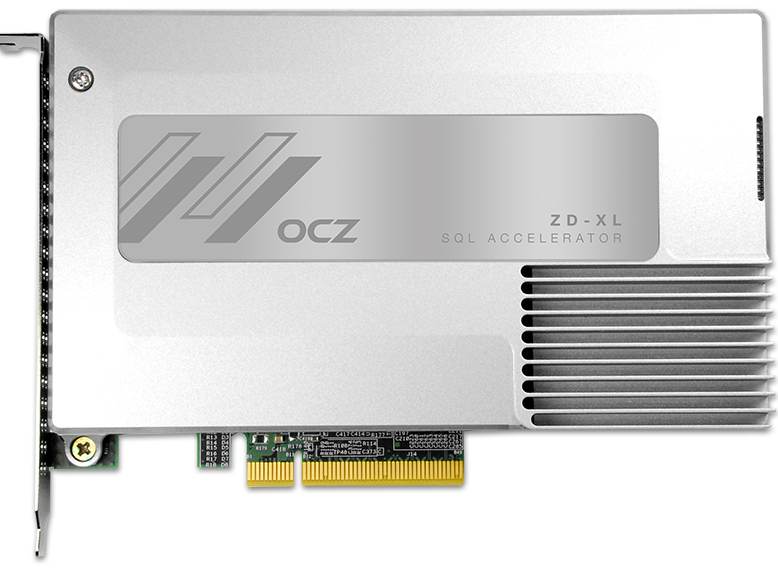Next Gen ZD-XL SQL Accelerator From OCZ
Extends Microsoft's flash-based buffer pool extension service.
This is a Press Release edited by StorageNewsletter.com on July 21, 2014 at 2:57 pmOCZ Storage Solutions, a Toshiba Group company announced the introduction and availability of its next generation SQL Server acceleration solution.
The new ZD-XL SQL Accelerator 1.5 supports SQL Server 2014, 2012 and 2008 R2 versions expanding on the flash-based storage features that improve I/O access performance.
OCZ presented the new SQL accelerator through July 17th at the Microsoft Worldwide Partner Conference (WPC) 2014, Walter E. Washington Convention Center, Washington, DC.
ZD-XL SQL Accelerator 1.5 provides optimized flash acceleration for SQL Server through integration with the application and has been enriched over the previous ZD-XL 1.0 version to enable database administrators (DBAs) to unleash the power of SQL Server 2014 features, such as flash Buffer Pool Extension (BPE) support, so that database pages can be accessed faster by loading them directly from flash.
ZD-XL SQL Accelerator 1.5 features in support of SQL Server 2014 include:
- Integration with SQL Server management enabling acceleration at a per database level versus having to accelerate all of the databases files on disk. This provides fine granularity for selecting only those database files that need to be accelerated.
- Support for running SQL in a virtualized environment via VMware ESXi and Hyper-V enabling the flash resources to support multiple VMs running SQL Server workloads concurrently. HA through the Microsoft AlwaysOn Availability Group is supported as well.
- Remote flash services enabling SQL Server to run on blade servers so they can benefit from the high-performance and density of PCIe flash storage. This feature enables a remote connection over the network between SQL Server and the PCIe flash resource to deliver remote flash caching via OCZ’s proprietary Direct Pass Caching Technology.
“Our next generation SQL accelerator extends the SQL Server 2014 flash storage feature-set and uniquely exposes our PCIe-based on-host flash resources as local flash volumes, a flash cache for HDD volumes, or any combination of both, efficiently distributing random workloads in parallel between all of its available flash,” said Daryl Lang, SVP of product management, OCZ. “This unrivalled flash partitioning enables transient files (such as tempDB) to benefit from fast flash performance while hot data is cached to flash for availability by SQL Server.“
The performance increases delivered by ZD-XL SQL Accelerator 1.5 are beneficial to SMBs and larger enterprises/data centers and based on database transactions per minute (TPM).
Internal testing performed by OCZ delivered over one million TPMs for a sample of 50 virtual users when ZD-XL SQL Accelerator 1.5 was located in the same server as the SQL application. This represented a TPM increase ranging from 18x to 22x for a local HDD-based configuration so the additional performance increases reduce an SMB’s need to invest in costly SAN and HDD storage, and protects their storage investment when they migrate to SQL Server 2014.
For larger enterprises/data centers that use ZD-XL SQL Accelerator 1.5 in a traditional SAN storage environment, the embedded software can cache large database files from the SAN onto server-side flash either locally or remotely. As a result, it achieved accelerated TPM performance up to 5x dependent on the performance of the SAN and the number of virtual users supported. Though performance gains may not be as high as an SMB using a local HDD configuration, performance is improved over a SAN while keeping the data highly available.
Payment processing is a SQL Server application dependent on the low-latency processing of multiple concurrent I/O commands. The processing of these commands must be as fast as possible as a large amount of small transactions are time-sensitive. In payment processing applications, storage is often the bottleneck. So as part of the development process, OCZ delivered a beta version of ZD-XL SQL Accelerator 1.5 to selective payment processing companies for their evaluation.
“With our business expanding and workloads increasing, we need the fastest and safest solutions to keep our transaction processing times to a minimum without sacrificing peace of mind, and the ZD-XL 1.5 solution is by far the fastest solution we have found to date,” said Prevan Pillay, database administrator, Tutuka Software (Ptry) Ltd, a large prepaid card processing company in South Africa. “The caching system was innovative, so regardless of how many read or write operations performed, ZD-XL 1.5 maintained superlative and consistent speed that helped us lower processing times on SQL databases.”
The ZD-XL SQL Accelerator 1.5 is available in three MLC configurations supporting 800GB, 1.6TB and 3.2TB storage capacities in a full-height/half-length form factor. Service and support options are available for each configuration.
About ZD-XL SQL Accelerator
It is an integrated hardware/software, plug-and-play acceleration solution optimized for SQL Server applications. It leverages OCZ’s PCIe SSD hardware and application-tuned software to deliver low latency flash that resolves potential SQL Server bottleneck issues enabling the flash to be deployed as a local flash volume, a flash cache for HDD volumes, or as a combination of both. The solution includes a combination of flash performance, a cache mechanism that makes statistically-optimized decisions on what data to cache, and a dynamic cache warm-up scheduler that enables workloads to be placed on flash cache in advance of demanding and critical jobs.
This PCIe accelerator card utilizes implementation wizards and step-by-step instructions to guide database administrators through the deployment process enabling best practice models of its flash-based resources to be simply and quickly set-up for efficient SQL Server acceleration. The GUI also divides the ZD-XL SQL Accelerator SSD resource into a volume section and cache section, advising on what data and workloads to place on flash. It also provides a list database volumes enabling to select the optimized policy to use on each workload and instructs them on how to pre-warm the cache in advance.













 Subscribe to our free daily newsletter
Subscribe to our free daily newsletter
